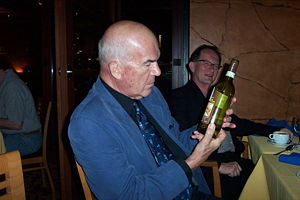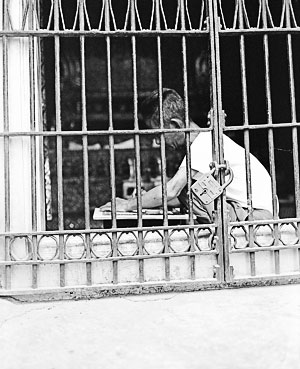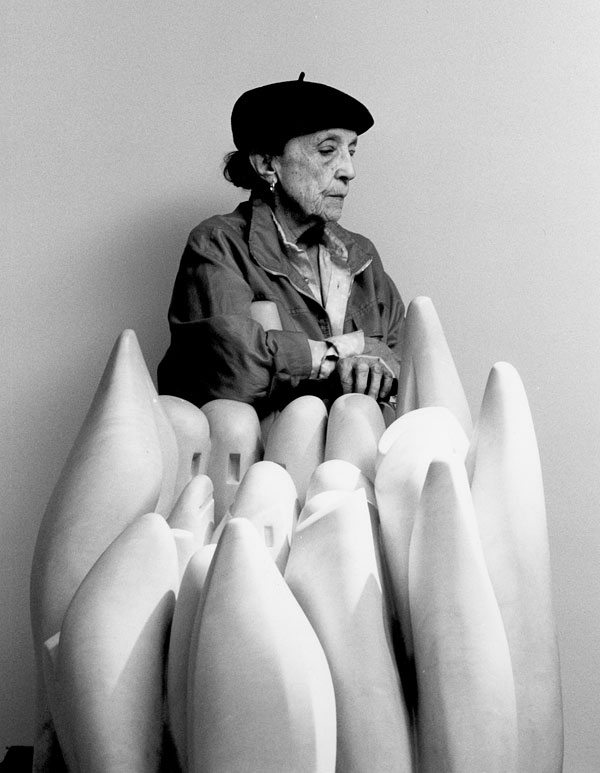Charming, but explain the wrist watch

“Time is not a thing, thus nothing which is, and yet it remains constant in its passing away without being something temporal like the beings in time.”
— Martin Heidegger, Being and Time (1927)
I’ve been accused of finding photos which incriminate authors, which I’ll gladly admit to, but the above photo/quote mash-up illustrates my skepticism towards philosophy, especially ontological mathy ones. Dude needs to relax and have some weisse bohnensuppe (German bean soup). It’s awesome ripping apart the palpable world on page, but Heidegger needs time just like everyone else — when his appointment with his proctologist is, never mind that they’ll only find beans and thyme.
via thethe

I once heard a scholar use the term “project” as he introduced another poet at a reading. He went on and on: “Her project echoes Dickinson’s project [blah blah blah].” The comparison seemed fine, but I wasn’t really sure the poet in question really had a “project” per se. Nowadays, poetry critics and scholars often refer to an entire body of work by one poet as a “project,” but I don’t think poems work that way. I think poems come from the earth and work through the mind from the ground up. I think poems are living things that grow from the earth into the brain
The way I see it, art doesn’t line up so much in a dichotomy between traditional and experimental (especially in a post-common-style era) as in one between reassuring versus destabilizing.
Richard Powers
Thomas Jefferson, make up your mind

“We will be soldiers, so our sons may be farmers, so their sons may be artists.”
— Thomas Jefferson
“The tree of liberty must be refreshed from time to time with the blood of patriots and tyrants.”
— Thomas Jefferson
20 Lines from 20 Lines a Day by Harry Mathews
 In 1983-1984, while writing Cigarettes, Harry Mathews followed Stendhal’s dictum of writing “twenty lines a day, genius or not.” In 1988, Dalkey Archive published the notebook of all of Mathew’s daily 20 lines. Lots is genius. Here are 20 bits (though I will note that the real pleasure is in the accrual of the bits in daily sections and in the whole project, so if you like the bits then just think!):
In 1983-1984, while writing Cigarettes, Harry Mathews followed Stendhal’s dictum of writing “twenty lines a day, genius or not.” In 1988, Dalkey Archive published the notebook of all of Mathew’s daily 20 lines. Lots is genius. Here are 20 bits (though I will note that the real pleasure is in the accrual of the bits in daily sections and in the whole project, so if you like the bits then just think!):
No matter how much one loves sunshine, its assault here on the eyes and skin makes shade delectable. One knows one’s tan will have more fuel than it can use.
…even if the air was cluttered with social smells and substances.
Or should one aim at portraying objects that are perpetually in flux or, better, that are transformed by our very description of them, like this page?
…but even if the basis of simile is continuity, to compare wobbly daffodils to invisibly moving stars is like comparing white bunny tails to snowy mountain peaks. So let’s do that.
…how to manage disagreeable emotions by scheduling them…
‘Nothing will ever be the same,’ except oneself, and who wants to rely on that pathetic little monster?
Do I now run errands to make the outdoors safe? Why does buying things, especially ones that are relatively expensive, calm me so extraordinarily?
But watch out: ‘fragmented, exciting’ mustn’t become an excuse for getting less done.
Every morning–early every morning–I’ll set aside ten minutes and concentrate exclusively on feeling anxious about sitting down to write. The most rudimentary sense of absurdity should get me going by minute number three.
How to Kill a Character
This is how the great Patrik Ourednik kills a character. Let it be a lesson to one and all:
Naiman died as stupidly as he lived. One day he decided to get a new washing machine for the cottage. But what to do with the old one? He loaded it into his car, drove into the forest, and rolled the machine to the top of the hill, intending to push it into a gorge; one garbage dump more or less, the Czech woods had survived worse. But no matter how hard he leaned into the thing, it wouldn’t budge, so, taking a few steps back, he sprinted forward, spinning around and throwing his haunches into it; the washer sailed into the gorge and Naiman along with it. Some nosy hiker discovered the body five days later, and the South Bohemian Tribune ran a brief obituary headlined “Expert Meets Tragic Death.”
Dyk gave a creaky laugh. Memories are the balm of old age.
Damn.
 Here’s something to read:
Here’s something to read:
“The young ones called each other out from their cells. Set to set, block to block, nation to nation. They called each other soldier. Six pop, five drop, nines and gats and gauges. Greetings and threats indistinguishable in the voices of monster children.”
—Firework, Eugene Marten, Tyrant Books
So, this is from the galley, which arrived on my desk at work today. I read the first 20 or so pages in a doctor’s waiting room. The first pages take place in a jail.
When you get a galley, it reminds you—the reader—that it is an uncorrected proof, and that some small changes may be made, and that you should check with the publicity department or the finished book before quoting from it somewhere.
I didn’t do that. I’m not going to do that. Read that paragraph—what would you change?
Seriously, Gian. If you change anything in that paragraph, I’m coming for your ass.
Good Advice

The new issue of Gulf Coast features a roundtable between Matthew Rohrer, Heather Christle, Matthew Zapruder, & Zachary Schomburg on what “surrealism” means today in American poetry.
Most interesting is what Matthew Rohrer says about surrealism and optimism.
Power Quote: The Comb Over

Now that even professional athletes are wearing mohawks, I’m pretty sure the only transgressive hairstyle is the comb over.
—My buddy Jordan
Maybe we should all start writing melodrama. Should we? Would that be the most transgressive choice we could make?
***
Wait, are we transgressive? Are we trying to transgress now? I can’t remember.
***
Louise Bourgeois on Writing

“Art is manipulation without intervention.”
“I am not what I am, I am what I do with my hands.”
“Surrealism is anathema for me. Because the surrealists made a joke of everything. And I consider life a tragedy.”
“I like Francis Bacon best, because Francis Bacon has terrific problems, and he knows that he is not going to solve them, but he knows also that he can escape from day to day and stay alive, and he does that because his work gives him a kick.”
“Once I was beset by anxiety but I pushed the fear away by studying the sky, determining when the moon would come out and where the sun would appear in the morning.”
“Art is not about art.”
“It is not so much where my motivation comes from but rather how it manages to survive.”
